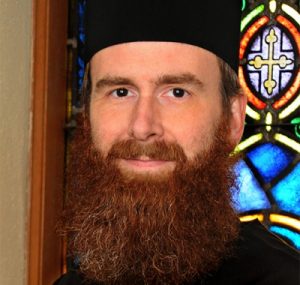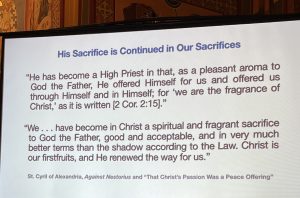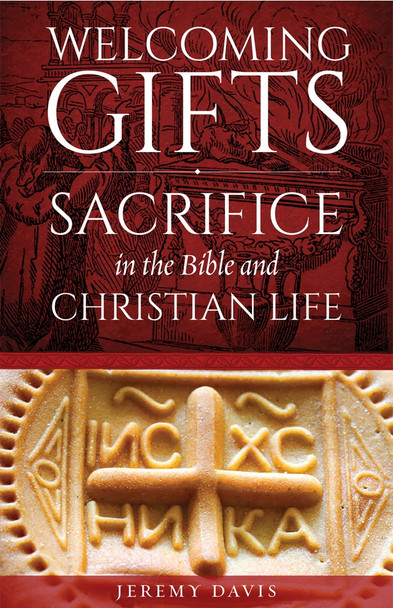I’m not a big fan of sacrifice. Or suffering. Not even “mild” sacrifice/suffering like participating in the fasting calendar for my church. I’m a member of St. John Orthodox Church in Memphis (where my husband, Father Basil Cushman, is Associate Pastor) and this past weekend our parish hosted the “top dog” of speakers for our “Pre-Lenten Retreat” . . . which didn’t really intrigue me on the front in, with its title:
Saved by Sacrifice: What is the Cross All About?
Why do I say, “top dog”? Well, as it turns out, Father Jeremy Davis is what we, in the Antiochian Orthodox Church, call the priest who is at the “top” of the chain of priests, just before our  bishops. Protosyn-gellos of the Archdiocese. He is an archimandrite and tonsured monk, and author of the book Sacrifice in the Bible and Christian Life. And also a children’s book, The Cellarers’s Celary. What an interesting combination, I thought, as I considered whether or not I wanted to attend the retreat at St. John this past weekend.
bishops. Protosyn-gellos of the Archdiocese. He is an archimandrite and tonsured monk, and author of the book Sacrifice in the Bible and Christian Life. And also a children’s book, The Cellarers’s Celary. What an interesting combination, I thought, as I considered whether or not I wanted to attend the retreat at St. John this past weekend.
Here we go again, I thought, dismally. More of the same-old-same-old stuff about how hard it is to be an Orthodox Christian. Like we didn’t already know that? Like sacrifice and suffering were things we wanted to hear more about?
And yet, I signed up and spent Friday night and much of Saturday at the retreat. Why did I stay until the end? Well, Father Jeremy’s talks on Friday night and even Saturday morning before lunch were what I would call “teasers.” I had to hang on for the punch line.
The Teasers
The teasers included a whole lot of history and specifics about Old Testament sacrifices. Nothing new there . . . except maybe for the way he framed them. Like calling whole burnt offerings an “extravagant display of hospitality” . . . and linking them to celebrations . . . shared meals and rejoicing before the Lord. He went on to talk about sacrifice as a GIFT: and how it can be ceremonial, friend-making . . . a way of building friendships. This was new to me, and I kept listening.
But here’s when he hooked me: Father Jeremy talked about the symbolic species of Old Testament sacrifices, specifically:
Cattle
Sheep
Goats
Turtleoves
Pidgeons
And how their qualities are also qualities that God seeks in us.
The sacrifices had to be:
Tame/obedient (like cattle)
Harmless (like sheep)
Fruitful (like goats)
Whole/perfect (like turtledoves)
Herbivores (like all of these)
My mind immediately went to my struggle with fasting, and why it matters to fast from meat at certain times, for example. And although I found this section of Fr. Jeremy’s talks helpful, I was still waiting for him to bring us out of the Old Testament and into our current day situation as Christians.
I’m paraphrasing from my notes now, but as I understood Fr. Jeremy, after human religion degenerated through misunderstanding and use of sacrifice and rituals, God started anew with Israel. Yes, the Mosaic sacrifice failed (Isaiah 66:3-4) because the law could not change the hearts of the people. “The Lord had prepared his own sacrifice.” (Zephaniah 1:7). God desired a righteous relationship with mankind . . . He offered a perfectly righteous life, which was His preparation for the sacrifice that culminated on the cross. The sacrifice is not the mere fact of His death, but it’s HOW HE ACCEPTED IT.
The Seque
Fr. Jeremy’s segue into his final talk on salvation and transformation helped me to understand the background he had given us. My favorite take-homes from this talk:
“We have become in Christ a spiritual and fragrant sacrifice.” (see II Corinthians 2:15.)
We are the fruit of His sacrifice.
The point of our offerings is not the offerings/sacrifices themselves, but what they represent—i.e. repentance, praise, etc. (Micah 6:6-8)

Want to read more about this? Get Father Jeremy’s book HERE, and LISTEN TO HIS TALKS HERE: Welcoming Gifts: Sacrifice in the Bible and Christian Life.
You can also watch the presentations he gave at St. John HERE.
